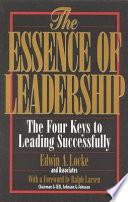
The Essence of Leadership
The Four Keys to Leading Successfully
Examines the style and methods of corporate giants.
- ISBN 13 : 9780739100547
- ISBN 10 : 0739100548
- Judul : The Essence of Leadership
- Sub Judul : The Four Keys to Leading Successfully
- Pengarang : Edwin A. Locke,
- Kategori : Business & Economics
- Penerbit : Lexington Books
- Bahasa : en
- Tahun : 1999
- Halaman : 120
- Google Book : http://books.google.com/books?id=pptuHRbcLgwC&dq=intitle:Leadership&hl=&source=gbs_api
-
Ketersediaan :
Examines the style and methods of corporate giants.









